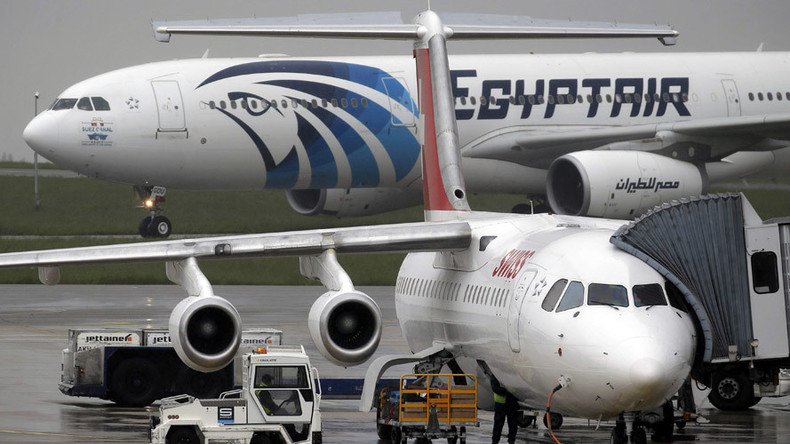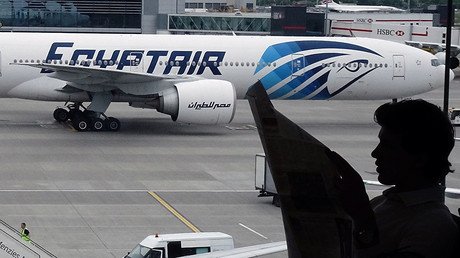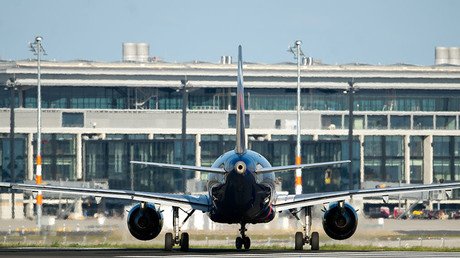‘Airlines should train crews to be vigilant as terrorists slip through security cracks’

Terrorists are very difficult to track and airlines should train their crews very well to spot these people and be very careful when airport staff are onboard or close to the aircraft, aviation analyst Fabrizio Poli told RT.
READ MORE: Search for EgyptAir flight missing over Mediterranean LIVE UPDATES
RT: There are reports the EgyptAir passenger plane spent just 90 minutes at Charles de Gaulle airport before departing for Cairo. Is that enough time to thoroughly check an aircraft before it turns round for another flight?
Fabrizio Poli: It all depends on how it’s done. I’ve worked for a number of different airlines. And on some of the low cost airlines – the cleaning of the aircraft is done by the cabin crew. So they are on the aircraft all the time. With other airlines as you land and then you get like 20 different cleaners come onboard the aircraft. And it’s very difficult for cabin crew to monitor these people running up and down the aircraft and that…
I was looking at EL AL, the Israeli national carrier; they’ve got a very, very good security system in place. And it is down to really training your crew properly. I would personally have the crew do the cleaning, or whatever and not have the airport people come onboard, because you never know, you can’t control all the airports you go to. And right now there are a lot of security problems over in Europe with terrorism and that. I’d be very, very vigilant and very, very careful.
RT: Air traffic controllers are on strike today at the very same airport from where the plane departed in the French capital. How can strike action like this one impact or hinder security?
FP: I don’t think air traffic control is going to be a problem with putting bombs on aircraft or stuff like that...There are going to be delays, and a bit of disruption, and there are going to be a kind of knock-on effect. I don’t think that is going to have an effect on security or checking the aircraft and stuff like that. The baggage handlers are on strike. I understand that type of strike is going on as well right now at Charles de Gaulle; there are a number of strikes going on at the same time. That is the one we have to look at: it’s the baggage handlers, the people running around the airplane, when the airplanes are on the ground. Those are the people that need to be watched.
RT: Last November, there were reports that dozens of the airports employees, who had access to airliners, were on terror watch lists. Should there be a more thorough vetting system before you hire someone at a local airport?
FP: … You got to be very, very careful. A lot of these so-called terrorists slip through the cracks; they manage to get hired. Some of them are hiding; you don’t really know they are terrorists, and then they suddenly come out. It is very, very difficult to trap these people and these organizations. In reality it is not an organization – we’re talking about sporadic groups of people all over the world that get together – four or five of them and decide to strike.
So it is not like a massive organization with the president that is organizing everything. That is very, very difficult to track. Again, it is really down to the airlines to have their crew trained very well in spotting this kind of person and being very, very vigilant when these people come onboard of the aircraft or underneath putting bags in a hold. It is down to the airlines to train their crew and the crew to be out and chatting to each other during the turnaround, looking who is on the airplane and what they are doing and what they are getting up to.
RT: Germany resumed flights to Egypt just yesterday with Cairo hailing the revival of its tourism industry. Is this decision now proving to be premature?
FP: … This is one of the big problems with aviation, because airplanes move from country to country. The Airbus 320 can be flown and operated by a company in Egypt, like a company in the UK, one in the US. But the standards are very, very different. This is one of the problems aviation has had all the time. Yes, it is probably a bit too soon. I think systems need to be put in place. But the problem is: when the incident happened with the Metrojet explosion, people were queuing up to get on airplanes. There was such a queue that they were bribing the security people to jump the queue. And the security people were taking the money. So it’s a culture problem.
Yes, you have to train these people; yes you have to select them. A lot of the times a culture shift needs to happen. This is where the individual airlines, when they are going into certain countries, they should have their own people trained at home and let them take care of these things – then it will be a lot safer. I do see now a lot of businesses are going to be moving towards flying by private jets instead of going with the airlines, because with a private jet you control the whole airplane, while on the airlines a lot of the times you don’t.
We can’t rule out anything
The fact the plane made abrupt turns and lost altitude before disappearing from the radar doesn’t directly indicate the real reasons for the catastrophe, said Alex Macheras, independent aviation analyst.
Alex Macheras: ... There are certain procedures in place for flight crew that knows that in between each flight is a procedure known as the walk around. That involves a member of the flight crew – either the captain, or the first officer - exiting the flight deck, coming down the stairs of the aircraft and having an external examination between each flight of the day of that aircraft. That is just looking for things, exterior wise. For example, maybe there are little pieces of debris on the ramp that they may have picked up, or they might spot something peculiar.
That is why sometimes we know, as passengers that flights can be delayed just an hour or two, when we’re on the aircraft. In some circumstances a pilot would just want to double check something that he may have spotted on that walk around. So they haven’t done anything wrong in terms of what we know. Well, we’re quite sure that the flight crew would have almost definitely initiated that walk around on the turnaround, when the aircraft was in Paris before it left for Cairo.
RT: Do these procedures involve thorough checks on board of the aircraft as well as outside?
AM: That depends on the carrier. So the procedures are in place as to whether or not that airline deems it necessary to have its crew members, or their flight crews completely do a thorough inspection of the aircraft. I know airlines alike Emirates do that during the turnarounds ... EgyptAir isn’t the exception here. It is a flag carrier; it is the national airline of Egypt. However, it is completely up to them in terms of their procedures as to whether or not that does involve internal inspections.
RT: The Greek Defense Minister said the plane made abrupt turns and lost altitude before disappearing from the radar. What does it tell us about possible reasons behind the incident?
AM: …. What that shows us – what the Greek Defense Minister has said – is that the aircraft fell 22,000 feet, and while it was descending – it made a series of turns, some of them including a 360 degree turn to the right. It’s just a shocking and terrifying image to have a picture of this aircraft falling 22,000 feet whilst turning. It doesn’t really indicate that “it was definitely this” and it doesn’t really rule out anything.
Egypt said the crash is more likely to be a terror attack than anything else. So far, there has been no claim of responsibility from ISIS. It’s likely different groups may start claiming responsibility for the deadly incident, which does not necessarily mean it was a terrorist attack, Will Geddes, CEO of International Corporate Protection told RT.
“Inevitably, in the wake of these times for instance the authorities will likely get a number of different parties trying to claim responsibility and it will then be down to these authorities to try and filter those to determine whether any of those claims or groups are actually substantiated or could be substantiated in terms of the validity of them being behind an attack on something,” he said.
“It doesn’t necessarily mean that it is a terrorist attack; it is just some of these groups will come out of the woodwork claiming responsibility for anything they possibly can,” Geddes added.
The statements, views and opinions expressed in this column are solely those of the author and do not necessarily represent those of RT.














